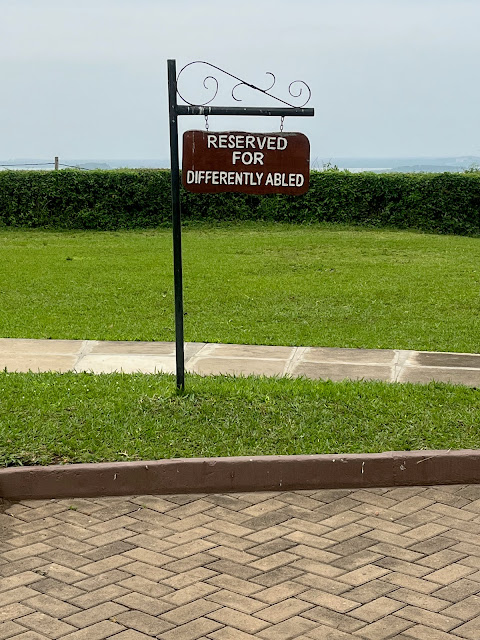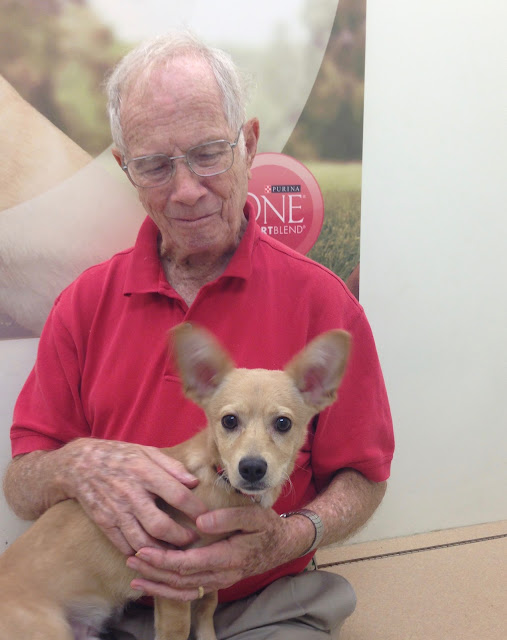Ditching the “Dis”
Disinterested.........Not interested
Dishonest.................Not honest
Disconnected.......Not connected
Disloyal.....................Not loyal
Displeased.............Not pleased
Disobey....................Not obeying
Disassembled.....Not assembled
Disabled..................WAIT !
The English language is filled with words containing the prefix "dis", meaning "not" - or simply negating its root word. We have employed the term, "disabled", in parking spaces, movie theaters, on bathroom doors, seats on buses and trains, in voting booths, and places of worship, among other public locales.
It was on a trip to Uganda to trek mountain gorillas, that our guide, Ham, pulled into the parking lot of our lodge, and there it was!
Prominently situated, was a sign that read, "Reserved for Differently Abled". Like an arrow to my heart, I realized that we had been "dissing" a segment of our population by using language that feels like it emphasizes what is wrong with a person rather than the countless things that aren't.
Putting myself in the position of someone who might be described as "disabled", I shuddered to think that it would mean I might be viewed as "not able", or somehow, "less than".
If I suddenly required the use of a wheelchair or crutches, I recognized that people who use assistive measures on an ongoing basis are actually MORE able and adept at these skills than I would be. In their realms, would I be the one who would be considered "dis"abled"?
When I tell people that I spent 2 and a half weeks in Uganda, the bulk of those days being hosted in various mountain lodges, I am asked questions such as:
"Were you able to drink the water?"
"Yes."
"Did they have wifi?"
"Yes - they have access to wifi, albeit a bit spotty and inconsistent."
"So, like, what kind of food did they have?"
"The same kind that you and I eat stateside."
"Do they speak English?"
"Yes, very well! In addition to Swahili!"
"Did you ever feel worried about your safety while you were there?"
"Nope! Comfortable and safe the entire time!"
"Could you shower?"
"Yes! But in one of the lodges, the staff drew hot water and poured it into a large bucket attached to ropes outside of the shower stall."
"Were the roads paved?"
"Define 'paved'."
And so, the queries continued based upon images of Uganda conjured in their imaginations.
Perhaps that is why, upon returning home, the sign designating parking for the "Differently Abled" remained firmly affixed in my mind. While parts of this east African country may not be as modernized as many places in the United States, the hearts of their people rival those of any other region. They are kind, happy, dedicated, proud, smart, and caring - as evidenced, for example, by the way they refer to others who might just get through the world a bit differently than the "Average Joe".
By posting signs that read, "Reserved for Differently Abled", they are exemplifying the importance of honoring all people and respecting, as well as underscoring, their capabilities rather than highlighting the "dis", the "not", or the "can't".
What if more countries (and people, in general) followed Uganda's lead and sought to be kinder, more inclusive, less harsh with words and judgements? What if we all put forth more effort in seeing what people CAN do rather than accentuating their limitations? What if everyone had the social conscience to embrace differences and allow themselves to learn from people who thrive despite the labels that are often placed upon them by others?
Although the villages that lie within western Uganda may be slower paced in acquiring some of the modern luxuries we often take for granted, they far surpass us in their acceptance of one another - beginning with something as simple as language.
In addition to using “people first” wording, (Example: “the MAN who uses a wheelchair” rather than “the wheelchair-bound man”), I am now committed to refraining from using the descriptor, “disabled”, in favor of adding the more compassionate and inclusive phrase, “differently abled”, to my vernacular.
Because it requires just one person to initiate a shift in mindset, I volunteer to be that catalyst. One tiny pebble can impact a large body of water, sending beautiful ripples through its once sedentary surface. My goal is to be that small rock and invite others join me to effect a change that demonstrates empathy and sensitivity towards others, making sure we acknowledge, through both language and actions, that we choose to see people’s abilities and support the necessary accommodations for those who might require them.
I propose that we ditch the “dis” when it comes to ability.
Who’s in?
© Cre8ive Writes, LLC


Love this!
ReplyDeleteSo glad! Thank you!
DeleteI’m in!!
ReplyDeleteYay, You!
DeleteOh, Sheri - THIS! This is a wonderful story, and reminder & wake-up call for us all. Just putting ourselves in the shoes (or wheelchair) of others and our perspective alters immediately. I join you as the next pebble in ditching the “dis”, and will share this with others so they can choose to do the same.
ReplyDeleteI'm so glad! We can do it!!
DeleteYou have made a very interesting suggestion. I would join you in ditching the "dis".
ReplyDeleteFantastic!! Thank you!
DeleteAbsolutely agree with you !!!!
ReplyDeleteThanks for sharing your wonderful stories
Thanks for reading!!
DeleteJust beautiful!!! Love this
ReplyDeleteThank you, Sal❣️💛
Delete